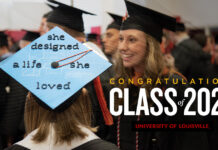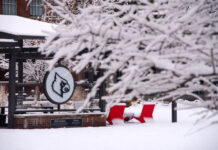
The National Coalition Against Domestic Violence (NCADV) reports that 1 in 5 college students say they have been abused by an intimate partner, 25% of female students experience sexual assault during their college career and 13% of college women report they have been stalked.
For 25 years, Prevention, Education, and Advocacy on Campus and in the Community (PEACC) has provided confidential advocacy to students, faculty and staff who have been impacted by interpersonal violence, sexual assault and stalking, in addition to providing prevention education.
UofL News talked with PEACC Director Tish Pletcher, who has been with the organization 10 years, about how PEACC continues to make a positive impact on the campus community.
UofL News: How would you define the core mission of PEACC?
Pletcher: We say our mission to pursue excellent and inclusive service has two primary parts: First, we work to end power-based personal violence by providing the campus community with the tools and support to make that happen through the Green Dot bystander intervention training and outreach programming. Second, we advocate for anyone affected by sexual assault, partner violence and stalking on individual, organizational and public levels through our services. With statistics like 1:3, 1:4 and 1:10, all of us know people affected by power-based personal violence.
UofL News: For 25 years, PEACC has been there for staff, faculty and students who need assistance. What kind of changes have been the most significant in that time? How has the issue evolved?
Pletcher: Our vision and mission have remained consistent, but our work is deepening. With our intervention, we are moving beyond crisis response to include multiple doors of access for survivors to address their trauma. We offer trauma informed yoga, meditation walks, writing workshops, a survivor network – you name it! These are all research-based approaches that might be helpful to a survivor after assault or intimate partner violence. It’s our job to offer as many of these as possible.
One way the issue itself has evolved is that we are no longer just talking about the violence, but all the life factors that a person might face with this issue.
UofL News: Prevention education programming is a core aspect of PEACC. Can you tell us more about prevention efforts and how allies can help in those efforts?
Pletcher: We have shifted our focus from the victim and perpetrator to bystanders. We teach students, faculty and staff to recognize warning signs of intimate partner violence, stalking and sexual assault, and how they can respond. That might be to directly check in with a person, cause a distraction in the moment, or even delegate to someone else. It doesn’t matter what a person does; it just matters that they do something. If we as bystanders know what to do to step in and intervene, we can significantly impact the rates of violence on our campus.
UofL News: What societal or political factors affect the issue of interpersonal violence?
Pletcher: Funding. Resources. Politics and policies. Systems change (or lack thereof). Oppression in all its forms. I could go on and on.
UofL News: What is still disheartening? What is encouraging?
Pletcher: It is disheartening every time another person walks in for services, and to hear the stories of people continuing to hurt other people. What’s encouraging is seeing all the people on campus who say “I want to help, I believe in doing my part, and I’m here for it.” Seeing them come out to a Green Dot Dodgeball Contest, join Men of PEACC for a Lunch & Learn, invite us to their RSO, walk a friend or classmate into our office to talk to an advocate. It makes my heart happy.
Another encouragement is the survivors who walk through our doors. They never, ever cease to amaze me. I learn something from them every day and I’m a better human being because of them. They make PEACC what it is.






























